
Dentures – Grafton, WI
Get Your Smile Back with Dentures!
Have you been going through life with fewer teeth than you’d like? At Sweet Smiles Family Dentistry, we’re here to help you get your smile back with a set of beautiful dentures!
We use the highest quality materials and a patient-centered approach when crafting our prosthetics, so if you’re missing teeth in Grafton, we can make you a set of dentures that can help you talk, chew, and smile again. Call us today for a consultation and we’ll talk about whether dentures are a good choice for you.
Why Choose Sweet Smiles Family Dentistry For Dentures?
- Durable Dentures Made of the Highest Quality Materials
- Two Experienced Dentists At Your Service
- Offers Partial, Full, and Implant Dentures
Who’s a Good Candidate for Dentures?

After scheduling a consultation with our team, you'll visit our office for a thorough assessment of your oral health. This will help us identify the most suitable method for replacing your missing teeth. We must ensure your gums are in excellent condition and your jawbone is sturdy enough to support the restorations. That way, we can prevent any premature need for replacements. Rest assured – our team uses only top-notch materials to craft prosthetic teeth that are durable, comfortable, and closely resemble natural teeth. Click on the button below to learn what makes an ideal candidate for dentures, as well as other restorative options you can consider.
Effects of Missing Teeth

First things first, you need to understand what causes missing teeth and why they need to be replaced. According to the American College of Prosthodontists, some common reasons include tooth decay, gingivitis, accidental trauma, and poor oral hygiene. Sometimes even certain system conditions can increase the risk of tooth loss!
If you’re missing one or more teeth, you must replace them as soon as possible. Otherwise, you could experience complications like difficulty eating and/or chewing, trouble speaking, facial sagging, and lower self-esteem. Further issues may include gum recession, dental drift, and jawbone deterioration.
What Qualifies You for Dentures?

For most people, dentures are a viable solution for tooth loss. This restorative choice is ideal for patients experiencing moderate to severe tooth loss, as well as those with sensitive or decayed teeth. However, it's important to have sufficient healthy gum tissue and a sturdy jawbone for a successful restoration.
The extent of tooth loss can also impact the type of denture recommended. Depending on whether you've lost one, several, or all of your teeth, you may choose from full, partial, or even implant dentures. These options are typically more cost-effective than alternative treatments, making them a great choice for budget-conscious individuals.
Alternative Tooth-Replacement Options

Even if dentures aren't a suitable option for you, there are alternative solutions you can explore:
- Dental Bridges – These can be a great solution if you have one or several missing teeth in a row. The treatment may involve preparing your healthy natural teeth on either side of the gap, and with proper care, the results can last for over a decade.
- Dental Implants – If you're seeking a more stable foundation for your new teeth, dental implants could be the optimal choice. These metal posts are surgically placed directly into the jawbone, reconstructing the entire tooth structure from the roots up. It requires sufficient jawbone density and may come with a higher initial cost, but the natural-looking results can last for several decades to a lifetime with minimal maintenance!
Types of Dentures

We offer three different kinds of dentures: partial, full, and implant. Each of these kinds of dentures is useful in different situations and adheres to the mouth in different ways.
Dr. Muddana will be able to tell you more about which kind of dentures are best for your unique circumstances, but here is a brief rundown of what each of them is used for.
Partial Dentures

Even if you have some teeth, a big gap in your smile can make it hard to smile with confidence. Partial dentures are designed to replace a few teeth at a time and consist of a thin acrylic base with a few imitation teeth. This is secured to the surrounding teeth with metal hooks, allowing them to hold fast in place.
Full Dentures

If you’re missing all of your teeth, your dentures naturally won’t have anything to hook onto. Full dentures are therefore designed to attach directly to the gums via suction.
The base of full dentures is meticulously molded to the gums so that they can stay comfortably and firmly in position.
Implant Dentures

If the idea of taking out your dentures each night doesn’t appeal to you, implant dentures can be a great choice. As you might have guessed, these dentures are permanently affixed to dental implants, which are metal posts surgically placed in the jawbone.
This option offers greater stability than removable dentures, making it a great choice for people who want the strongest bite possible.
How Dentures Are Made
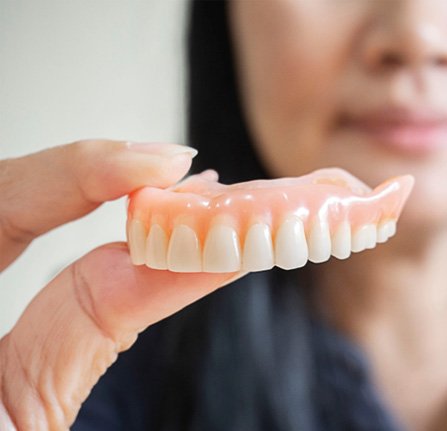
Once you decide that dentures are right for you, what’s next? By understanding how your dentures are made and what materials they are comprised of, you will appreciate your new smile that much more! Whether you opt for partial or full dentures, here are the steps you can generally expect. If you have any questions, don’t hesitate to give us a call.
What Are Dentures Made Of?
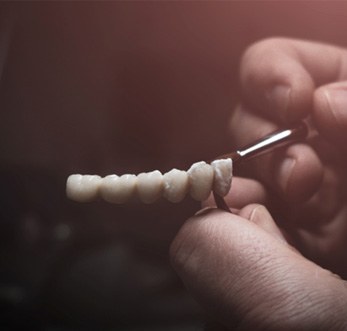
Dentures are made up of two different parts – the base and the replacement teeth. Here is what each component looks like:
- Denture Base: This is the foundational structure that gives the replacement teeth support. It can be made from a variety of materials, including acrylic, nylon, porcelain, resin, and metal. Most of the time, full dentures are made from acrylic because it can be easily tailored to match your natural gum tissue. Partial dentures often use metal clips with an acrylic base.
- Replacement Teeth: The replacement teeth are usually made from resin or porcelain since they both have a natural appearance. However, porcelain is typically only recommended for full dentures because it can be abrasive on the adjacent teeth.
The Denture Creation Process
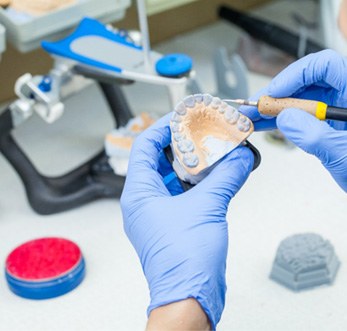
Each denture is custom-made for the patient’s mouth, so it requires a multi-step process. Here is a step-by-step of what this typically looks like:
- Step 1: Your dentist will take impressions of your upper and lower gums. This will be used to create a plaster model that acts as a replica of your mouth. This model is used to make sure your final denture is the perfect size and shape. Measurements of your jaw are also taken at this time.
- Step 2: The cast is sent to the dental laboratory. This is where your dentures will be made. They will create a wax model of your gum line.
- Step 3: The replacement teeth are set into place. A mechanical device, called an articulator, is used to attach the teeth with wax. The technician will then make minor adjustments by shaping and carving the wax to ensure it looks just like your gums. This wax base will be used for your complete dentures.
- Step 4: The wax dentures are sent back to your dentist for a fitting. If approved, the dentures are returned to the dental lab where the process will be completed.
- Step 5: Once back at the lab, the technician will boil the dentures to melt away the wax portions. To do this, the dentures are placed into a flask. Plaster is poured in to maintain the shape of the dentures. Then, the entire flask is placed into hot water.
- Step 6: Holes are made into the teeth so the acrylic can attach to it. A liquid separator is added to the plaster layer to prevent the acrylic from sticking. Acrylic is injected into the flask to replace the wax.
- Step 7: The plaster is carefully removed using special lab tools to reveal the dentures. The dentures are placed in an ultrasonic bath to remove any remaining plaster.
- Step 8: Any excess acrylic will be cut from the denture. After trimming, the denture is polished.
- Step 9: Now that your denture is complete, you will return to the office for a fitting. Adjustments will be made as necessary to ensure that everything fits, feels, and looks great!
Adjusting to Your New Dentures
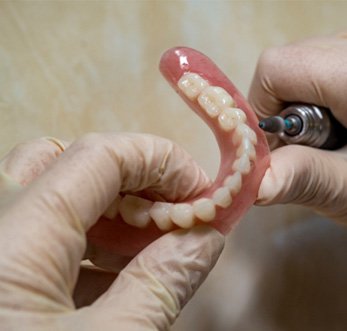
It is normal for your dentures to feel mildly uncomfortable at first. It’s common for patients to experience some soreness when speaking and eating. With time, your mouth will adjust to your dentures, and they will feel very similar to your natural teeth. To speed up this adjustment process, it helps to stick to softer foods, exercise your facial muscles, and experiment with an adhesive. If discomfort persists or you have any concerns, don’t hesitate to reach out to us.
Benefits of Dentures

Losing multiple teeth can make everyday activities like eating, speaking, and confidently smiling challenging. Fortunately, dentures in Grafton offer an effective solution, restoring your smile and bringing life-changing benefits. If you've experienced tooth loss, consider giving your smile a second chance with this method of tooth replacement! You can learn more about how opting for dentures can enhance your quality of life by reading below.
Psychological Benefits

Those without teeth may struggle to accept their tooth loss, which can lead to social anxiety and a higher risk of sadness and depression. However, by rejuvenating both the look and function of your smile with dentures, you are more likely to enjoy a boost of confidence and improved self-esteem!
Clearer Enunciation

It’s no surprise that tooth loss can make it difficult to speak clearly. Proper positioning of the lips and tongue is incredibly important for articulating words. Certain sounds become challenging without the tongue touching the teeth. Luckily, because dentures act as replacements for missing teeth, they can help you enunciate more clearly. With a brief adjustment period, you'll find yourself speaking more distinctly and effortlessly!
Improves Nutrition

Many nutrient-rich foods, such as vegetables, fruits, and proteins, are tough in texture. Tooth loss can hinder thorough chewing, leading to problems like indigestion and malnutrition. With dentures, you can enhance your chewing capabilities, allowing you to enjoy a broader diet rich in essential vitamins and minerals necessary for optimal health.
Preserves Oral Health

Choosing to restore your smile with dentures, especially when you still have some remaining natural teeth, can help stabilize them to prevent shifting. Additionally, dentures share the load of chewing, which can minimize wear and tear on your existing teeth.
Expands Opportunity

Making a positive first impression is extremely important when it comes to job interviews, sales, and getting promotions. A complete and attractive smile offers a distinct advantage! In fact, a 2019 study revealed a negative association between poor oral health and the likelihood of employment.
Understanding the Cost of Dentures

At Sweet Smiles Family Dentistry, every prosthetic that we craft is customized for each of our individual patient’s needs. Due to the highly customized nature of dentures, the cost of the treatment can vary from patient-to-patient. However, we’ll provide you with a detailed estimate before you commit to moving forward with the procedure and walk you through each of your payment options. In many cases, dental insurance plans will cover at least a portion of the cost of your treatment, but if you’re underinsured or uninsured, we also offer savings through our In-House Membership Plan as well as additional financing through CareCredit.
Factors That Affect the Cost of Dentures

There are several personalized factors that we take into account before providing you with an estimated price for your treatment. Some of these include:
- Whether you require any preparatory work before receiving your dentures, like gum disease therapy, tooth extractions, etc. These will help you get the most out of your restoration by ensuring your mouth is healthy enough to support them.
- How many replacement teeth you’re missing will determine whether you require a full or partial denture. Because partials are often smaller and require less material and labor to craft, they’re typically less costly.
- The materials you choose to have your dentures crafted from also have a large impact on the overall price of your service.
- Whether you choose to anchor your denture with dental implants, which will incur separate fees for implant placement, preparatory treatments, etc.
Are Implant Dentures More Expensive?
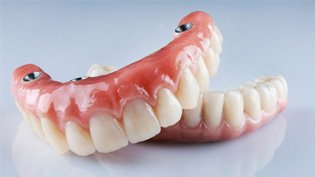
While implant dentures have a higher up-front cost than traditional dentures, they’re a great long-term investment. Due to their ability to last over 35 years, you’ll be able to save money with fewer adjustments and replacement visits during their lifespan. They’re also able to prevent jawbone deterioration and other impacts on your oral and overall health, which can help you avoid needing a bone graft in the future.
Does Dental Insurance Cover Dentures?

While most dental insurance plans will cover at least a portion of the cost of dentures, every plan is different, so you’ll need to call your provider directly to find out what you’ll be expected to pay out-of-pocket. Our team at Sweet Smiles Family Dentistry is an in-network provider with several major PPO dental insurance plans, and we accept Medicaid so you can get the most out of your coverage.
Other Options for Making Dentures Affordable

In addition to being an in-network provider with many insurance plans, we also partner with CareCredit to help patients split the total cost up into more manageable monthly payments. If you’re a member of our In-House Membership Plan, you can also save 15% on your procedure as well as receive coverage for all of your basic dental needs throughout the year.
Dentures Aftercare

Sure enough, dentures can reliably boost your smile’s looks and function. (You wouldn’t bother with them otherwise.) That said, these prosthetics need regular care to work well. Daily upkeep is vital for dentures to last a long time. Luckily, Sweet Smiles Family Dentistry is here to assist: listed below are several good tips on caring for dentures. By using them, your new teeth will stick around for years to come. Keep reading to learn more, or call our office for the details!
Removeable Dentures

Remove After Eating
You should always rinse your dentures after meals. With this habit, you’ll keep food and plaque from sticking to your grin. You’d then be at a much lower risk of oral issues.
Still, don’t use hot water for these rinses. Intense heat can actually warp a denture’s material. Given this fact, a steamy rinse would ruin your prosthetic’s fit.
Clean Your Restoration
Besides post-meal rinses, dentures also need once-daily cleanings. Such sessions remove germs and debris from the prosthetic.
Cleaning a denture isn’t that hard. Once the appliance is out of your mouth, just brush it with a toothbrush and hand soap. (Be careful to avoid regular toothpaste; it’s abrasive and erodes dentures.) You can also soak it in a cleaning solution if there’s time. Either way, rinse the denture before returning it to your mouth.
Keep Your Dentures Safe
While tough, dentures aren’t invulnerable. They’ll break if put under a strong force. So, always keep your dentures safe when they’re not in use.
Of course, several methods can protect dentures. One is to place a towel in your sink during cleanings. (That way, your dentures would be cushioned from falls.) Alternatively, you might store dentures in a secure case. The latter will keep pets or kids from breaking your replacement teeth.
Remove Dentures When You Sleep
To be honest, you shouldn’t wear dentures to sleep. It’s best to remove them from your mouth before bedtime. If possible, you could even soak them in a denture solution overnight.
While dentures are lifelike, using them constantly harms your health. The habit restricts your gum’s circulation, irritating your mouth’s tissues. It also increases your tongue’s plaque levels, raising the risk of cavities and gum disease. Always wearing dentures can even cause pneumonia.
Notice Changes
Once you’ve begun using dentures, look for changes in them or your mouth. Unexpected shifts can cause problems that need a dentist’s help. In particular, note whether you have mouth sores, gum irritation, or infections.
Most of all, see Dr. Muddanna if your dentures fit poorly or get damaged. Trying to fix the prosthetics yourself won’t end well. In contrast, our resident dentist can refit or replace the dentures.
All-on-4 Dentures
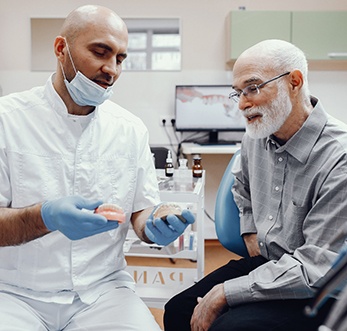
Unlike other kinds, All-on-4 dentures can’t be removed. They thus require different aftercare methods. Typically, these include:
- Twice-Daily Brushing – Brush your dentures twice a day with a soft-bristled toothbrush. (A sulcus brush would be especially useful, as it can clean between the restoration and your gums.)
- Once-Daily Flossing – Once a day, floss between your denture’s teeth. You might even try floss threaders to get under the appliance. On the other hand, a water flosser could also work.
- Regular Mouth Rinses – Rinse your mouth with fluoridated mouthwash daily. That way, you can prevent tartar growth.
Denture FAQs

Dentures are an excellent way to replace a lot of teeth all at once, but that can pose a pretty large life change for people who have been missing teeth for a while. It’s natural to have a lot of questions about these prosthetics before you take the plunge.
We’ll have a long conversation about what your particular treatment will look like at your consultation, but until then, here are some of the answers you may be looking for.
Is It Hard to Talk with Dentures?
Talking with dentures isn’t necessarily hard, but may take some getting used to when compared to talking without them. It’s common for patients to say they have a little bit of a lisp when talking with their dentures at first, so you may need to set aside some time to practice reading aloud or conversing with them in.
Some people also thrust their tongues against their bottom teeth when they speak, which can cause their lower dentures to come loose. This habit can be deeply ingrained and may take some time to unlearn.
That said, with a little bit of practice, anyone can talk easily with dentures. In the meantime, focus on speaking slowly and clearly until you get the hang of it.
Will Dentures Change the Shape of My Face?
Your teeth act like tentpoles that support the muscles on your face. Without them, it’s common for people to start to see their facial muscles sag, causing them to develop wrinkles prematurely.
Dentures can support your face, reversing the effects of tooth loss on your skin and making you look younger. This is why we work so hard to make sure that your restoration fits perfectly and offers the support that it should.
Can I Sleep with My Dentures?
We strongly recommend that our patients take out their dentures overnight. This gives your gums much-needed time to breathe, preventing the buildup of bacteria and saving you from uncomfortable sore spots.
It’s also a good idea to leave your dentures in a soaking solution while you’re sleeping. This keeps them fresh and free of bacteria so that they’ll be ready for you to wear in the morning.
Can I Use Regular Toothpaste to Clean My Dentures?
It’s important to brush your dentures every day, but you shouldn’t be using toothpaste when you do. While toothpaste feels smooth on your teeth, it actually contains mild abrasives. Your dentures are not as hard as your enamel, so toothpaste can leave tiny scratches on your prosthetic that allows for bacterial buildup.
Similarly, you should use a soft-bristled toothbrush to clean your dentures, not one with hard bristles. Use this toothbrush to clean plaque off of your dentures after every meal.
How Long Will You Have to Wait to Get Dentures After Your Teeth are Pulled?
Traditionally, the wait time after having teeth extracted is between six and eight weeks; however, the exact amount of time depends on the type of denture you’ll be receiving.
This waiting period gives your gums a chance to properly heal, as well as additional time to ensure that your new dentures fit properly.
If you’ll be getting implant-retained dentures, you’ll need to wait between four to six months for the dental implant to join with your jawbone via the osseointegration process.
Do Dentures Break Easily?
Your new dentures are extremely durable, but they weren’t designed to last forever. With proper care, they can last between five and seven years. However, be aware that accidents can happen, and common reasons dentures break is by being dropped while cleaning, inserting, or removing them.
Your dentures can also break or fracture if they fit poorly or have tiny defects in their base such as scratches or notches.
Even if you take excellent care of them, they can also become worn down from repeated use or stress.
Are Denture Adhesives Safe?
Denture adhesives can be very safe on a limited basis or as prescribed by your dentist. Please be cautious when using products that contain zinc. This mineral can be found in protein-rich foods as well as in some dietary supplements. If you overuse denture adhesive, you can ingest excess zinc, which could lead to health problems and even cause nerve damage.
Be sure to completely remove all adhesive material at the end of each day so your denture can be cleaned thoroughly of bacteria.
The FDA recommends the following tips for handling zinc-based adhesives:
- Follow the manufacturer's instructions for denture adhesives.
- Never use more adhesive than recommended.
- Be aware that all product manufacturers may not list every ingredient in their adhesive.
- Track how much denture adhesive you use by marking it on a calendar.
Can I Reline My Dentures Myself?
In recent years, social media has encouraged many patients to take up DIY denture relining. The theory is that you can save money by adjusting your prosthetics yourself. In fact, some stores and online retailers even sell home denture relining kits.
The truth is this is not a good idea. Only a trained dentist will have a qualified opinion as to how to fix improperly fitting dentures. Furthermore, if you’re not careful, your DIY relining could cause your dentures to fit even worse than before!
You also won’t have a good view if you perform a denture relining yourself. To truly grasp how to go about this type of procedure, you typically need to see what you’re doing. This can’t happen when you do it yourself, because you lack an outside perspective.
A DIY relining can also cause damage to the dentures that make them painful or make it difficult to chew with your prosthetic, particularly when you don’t have the correct tools to complete the procedure yourself.